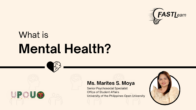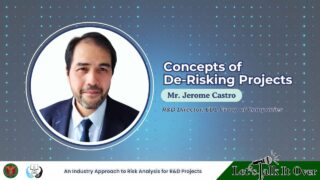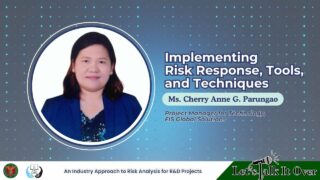What is mental health?
So let’s talk about mental health or kalusugang pangkaisipan.
So you know when most people think about mental health, they often imagine mental illness or disorders.
But really, mental health is so much more than that.
It’s about how we handle everyday life, how we feel, how we think, and how we interact with other people.
So imagine this: you’re a student and you have an exam coming up. You also have an assignment due next week.
So on top of that, maybe you’re working part-time or you’re helping out with family responsibilities.
So there’s a lot of things to juggle.
Now if you’re mentally healthy, you can manage this better.
For sure you will still feel the pressure, but you’re able to organize your time, and of course, to stay motivated.
But first, ano nga ba yung mental health or kalusugang pangkaisipan?
So according to WHO, mental health is a state of well-being that enable people to:
Number one, realize their abilities or their potentials.
Number two, cope with the stresses of life.
Number three, working productively or making sure that the time and effort you put in, of course, bring good results.
And lastly, contribute to society, whether that’s through your studies, your job, or your relationships.
So mental health is more than the absence of mental disorders.
Just like your physical health, your mental health can fluctuate. Para lang yung blood pressure natin.
So some days, you feel on top of the world.
You are focused with your task; you are motivated to finish your readings; you are ready to finish everything on your to-do list.
But on other days, you might feel tired; you might feel overwhelmed, or just not in the mood to deal with so many things that you need to do. So that’s normal.
Yes, lahat tayo nakakaranas ng ganon. But sometimes, the stresses doesn’t go away.
Imagine the feeling of anxiety about your exam, so you keep on thinking about the assignments you submitted.
You’re wondering if you did enough. Tama ba yung ginawa ko? Maayos ko bang nagawa?
So kung minsan, instead of moving on, paulit-ulit mo pa din na iniisip yung mga bagay na yon.
And it’s making it hard for you to concentrate on other tasks or makafocus ka sa iba pang mga bagay na kailangan mong gawin.
So kung minsan, hindi ka makatulog. And your thoughts start racing at night, as in kung ano-ano nating naiisip.
So on top of that, you might feel pressured by other responsibilities like deadlines piling up, balancing your academic work with personal life or maintaining even your relationships.
So when all these pressures build up, nagpapatong-patong na, and it starts affecting your daily life.
This is when mental health difficulties might be creeping in.
So it’s no longer just a normal stress; it’s something deeper and when left unresolved, it can really affect not just your academics, but your relationships, your work, and even your overall happiness.
But of course, just like we have treatments for physical illness, may mga maaari din tayong gawin upang mapabuti ang ating kalusugang pangkaisipan, kagaya ng ano-ano yon?
So exercise; balanced diet; pagkain ng masusustansya; sapat na tulog na kung minsan napakahirap nating gawin; and of course, seeking help sa mga mental health professionals.
Pero this is the reality here in the Philippines. Mental health is often a difficult topic to discuss.
Many people of different ages, whether adult, at lalo na yung mga teenagers.
They struggle in silence due to the stigma that surrounds, sabi nga, mental health issues, particularly when it comes to seeking help from professionals like the psychologist or the psychiatrist.
So let’s break the stigma of seeking mental health.
Remember, asking for help is not a sign of weakness, but a sign of strength.

























